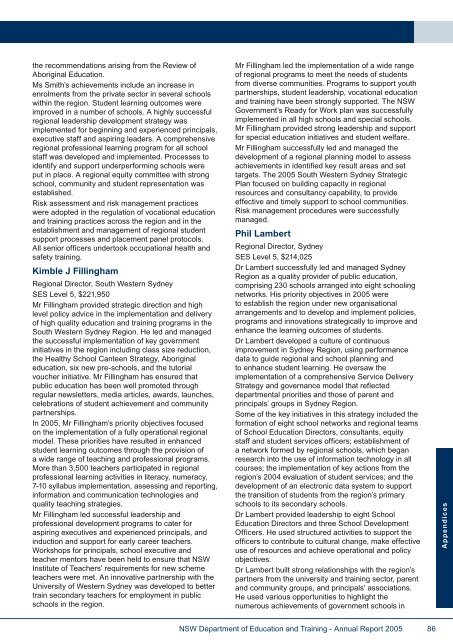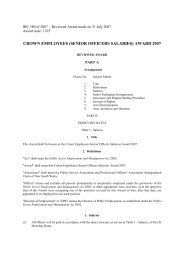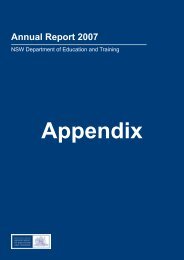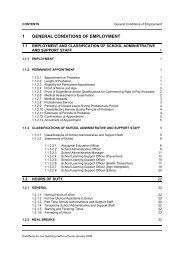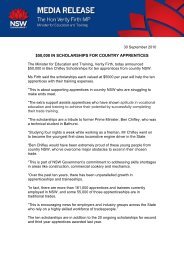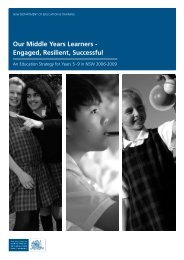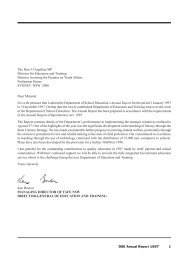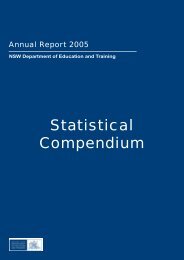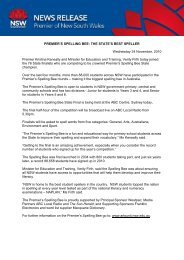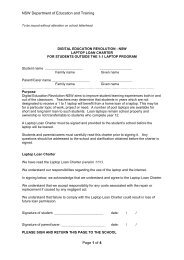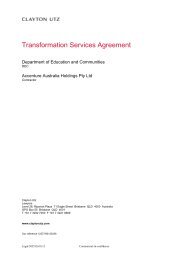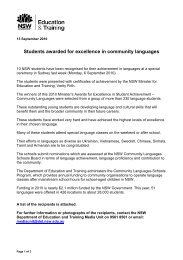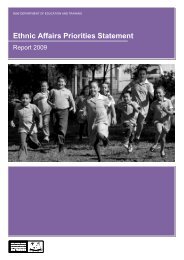Annual Report 2005 NSW Department of Education and Training
Annual Report 2005 NSW Department of Education and Training
Annual Report 2005 NSW Department of Education and Training
Create successful ePaper yourself
Turn your PDF publications into a flip-book with our unique Google optimized e-Paper software.
the recommendations arising from the Review <strong>of</strong><br />
Aboriginal <strong>Education</strong>.<br />
Ms Smith’s achievements include an increase in<br />
enrolments from the private sector in several schools<br />
within the region. Student learning outcomes were<br />
improved in a number <strong>of</strong> schools. A highly successful<br />
regional leadership development strategy was<br />
implemented for beginning <strong>and</strong> experienced principals,<br />
executive staff <strong>and</strong> aspiring leaders. A comprehensive<br />
regional pr<strong>of</strong>essional learning program for all school<br />
staff was developed <strong>and</strong> implemented. Processes to<br />
identify <strong>and</strong> support underperforming schools were<br />
put in place. A regional equity committee with strong<br />
school, community <strong>and</strong> student representation was<br />
established.<br />
Risk assessment <strong>and</strong> risk management practices<br />
were adopted in the regulation <strong>of</strong> vocational education<br />
<strong>and</strong> training practices across the region <strong>and</strong> in the<br />
establishment <strong>and</strong> management <strong>of</strong> regional student<br />
support processes <strong>and</strong> placement panel protocols.<br />
All senior <strong>of</strong>ficers undertook occupational health <strong>and</strong><br />
safety training.<br />
Kimble J Fillingham<br />
Regional Director, South Western Sydney<br />
SES Level 5, $221,950<br />
Mr Fillingham provided strategic direction <strong>and</strong> high<br />
level policy advice in the implementation <strong>and</strong> delivery<br />
<strong>of</strong> high quality education <strong>and</strong> training programs in the<br />
South Western Sydney Region. He led <strong>and</strong> managed<br />
the successful implementation <strong>of</strong> key government<br />
initiatives in the region including class size reduction,<br />
the Healthy School Canteen Strategy, Aboriginal<br />
education, six new pre-schools, <strong>and</strong> the tutorial<br />
voucher initiative. Mr Fillingham has ensured that<br />
public education has been well promoted through<br />
regular newsletters, media articles, awards, launches,<br />
celebrations <strong>of</strong> student achievement <strong>and</strong> community<br />
partnerships.<br />
In <strong>2005</strong>, Mr Fillingham’s priority objectives focused<br />
on the implementation <strong>of</strong> a fully operational regional<br />
model. These priorities have resulted in enhanced<br />
student learning outcomes through the provision <strong>of</strong><br />
a wide range <strong>of</strong> teaching <strong>and</strong> pr<strong>of</strong>essional programs.<br />
More than 3,500 teachers participated in regional<br />
pr<strong>of</strong>essional learning activities in literacy, numeracy,<br />
7-10 syllabus implementation, assessing <strong>and</strong> reporting,<br />
information <strong>and</strong> communication technologies <strong>and</strong><br />
quality teaching strategies.<br />
Mr Fillingham led successful leadership <strong>and</strong><br />
pr<strong>of</strong>essional development programs to cater for<br />
aspiring executives <strong>and</strong> experienced principals, <strong>and</strong><br />
induction <strong>and</strong> support for early career teachers.<br />
Workshops for principals, school executive <strong>and</strong><br />
teacher mentors have been held to ensure that <strong>NSW</strong><br />
Institute <strong>of</strong> Teachers’ requirements for new scheme<br />
teachers were met. An innovative partnership with the<br />
University <strong>of</strong> Western Sydney was developed to better<br />
train secondary teachers for employment in public<br />
schools in the region.<br />
Mr Fillingham led the implementation <strong>of</strong> a wide range<br />
<strong>of</strong> regional programs to meet the needs <strong>of</strong> students<br />
from diverse communities. Programs to support youth<br />
partnerships, student leadership, vocational education<br />
<strong>and</strong> training have been strongly supported. The <strong>NSW</strong><br />
Government’s Ready for Work plan was successfully<br />
implemented in all high schools <strong>and</strong> special schools.<br />
Mr Fillingham provided strong leadership <strong>and</strong> support<br />
for special education initiatives <strong>and</strong> student welfare.<br />
Mr Fillingham successfully led <strong>and</strong> managed the<br />
development <strong>of</strong> a regional planning model to assess<br />
achievements in identified key result areas <strong>and</strong> set<br />
targets. The <strong>2005</strong> South Western Sydney Strategic<br />
Plan focused on building capacity in regional<br />
resources <strong>and</strong> consultancy capability, to provide<br />
effective <strong>and</strong> timely support to school communities.<br />
Risk management procedures were successfully<br />
managed.<br />
Phil Lambert<br />
Regional Director, Sydney<br />
SES Level 5, $214,025<br />
Dr Lambert successfully led <strong>and</strong> managed Sydney<br />
Region as a quality provider <strong>of</strong> public education,<br />
comprising 230 schools arranged into eight schooling<br />
networks. His priority objectives in <strong>2005</strong> were<br />
to establish the region under new organisational<br />
arrangements <strong>and</strong> to develop <strong>and</strong> implement policies,<br />
programs <strong>and</strong> innovations strategically to improve <strong>and</strong><br />
enhance the learning outcomes <strong>of</strong> students.<br />
Dr Lambert developed a culture <strong>of</strong> continuous<br />
improvement in Sydney Region, using performance<br />
data to guide regional <strong>and</strong> school planning <strong>and</strong><br />
to enhance student learning. He oversaw the<br />
implementation <strong>of</strong> a comprehensive Service Delivery<br />
Strategy <strong>and</strong> governance model that reflected<br />
departmental priorities <strong>and</strong> those <strong>of</strong> parent <strong>and</strong><br />
principals’ groups in Sydney Region.<br />
Some <strong>of</strong> the key initiatives in this strategy included the<br />
formation <strong>of</strong> eight school networks <strong>and</strong> regional teams<br />
<strong>of</strong> School <strong>Education</strong> Directors, consultants, equity<br />
staff <strong>and</strong> student services <strong>of</strong>ficers; establishment <strong>of</strong><br />
a network formed by regional schools, which began<br />
research into the use <strong>of</strong> information technology in all<br />
courses; the implementation <strong>of</strong> key actions from the<br />
region’s 2004 evaluation <strong>of</strong> student services; <strong>and</strong> the<br />
development <strong>of</strong> an electronic data system to support<br />
the transition <strong>of</strong> students from the region’s primary<br />
schools to its secondary schools.<br />
Dr Lambert provided leadership to eight School<br />
<strong>Education</strong> Directors <strong>and</strong> three School Development<br />
Officers. He used structured activities to support the<br />
<strong>of</strong>ficers to contribute to cultural change, make effective<br />
use <strong>of</strong> resources <strong>and</strong> achieve operational <strong>and</strong> policy<br />
objectives.<br />
Dr Lambert built strong relationships with the region’s<br />
partners from the university <strong>and</strong> training sector, parent<br />
<strong>and</strong> community groups, <strong>and</strong> principals’ associations.<br />
He used various opportunities to highlight the<br />
numerous achievements <strong>of</strong> government schools in<br />
Appendices<br />
<strong>NSW</strong> <strong>Department</strong> <strong>of</strong> <strong>Education</strong> <strong>and</strong> <strong>Training</strong> - <strong>Annual</strong> <strong>Report</strong> <strong>2005</strong> 86


